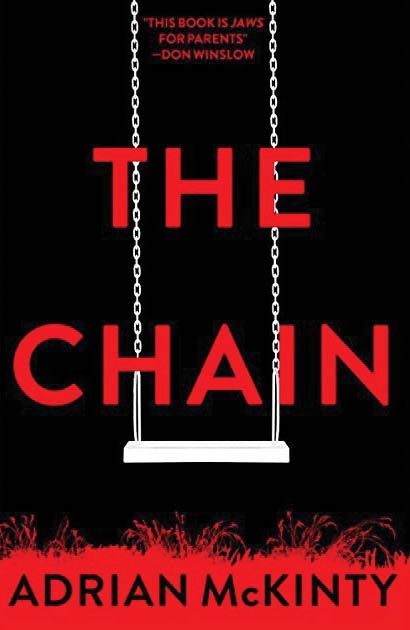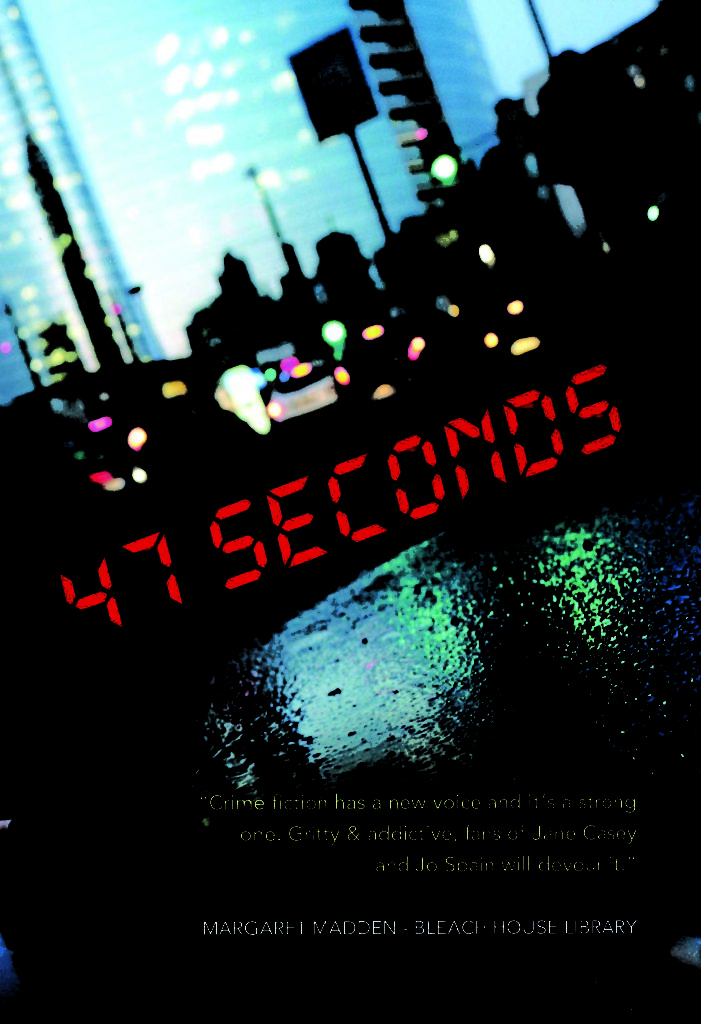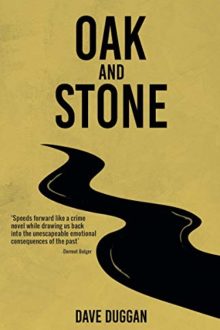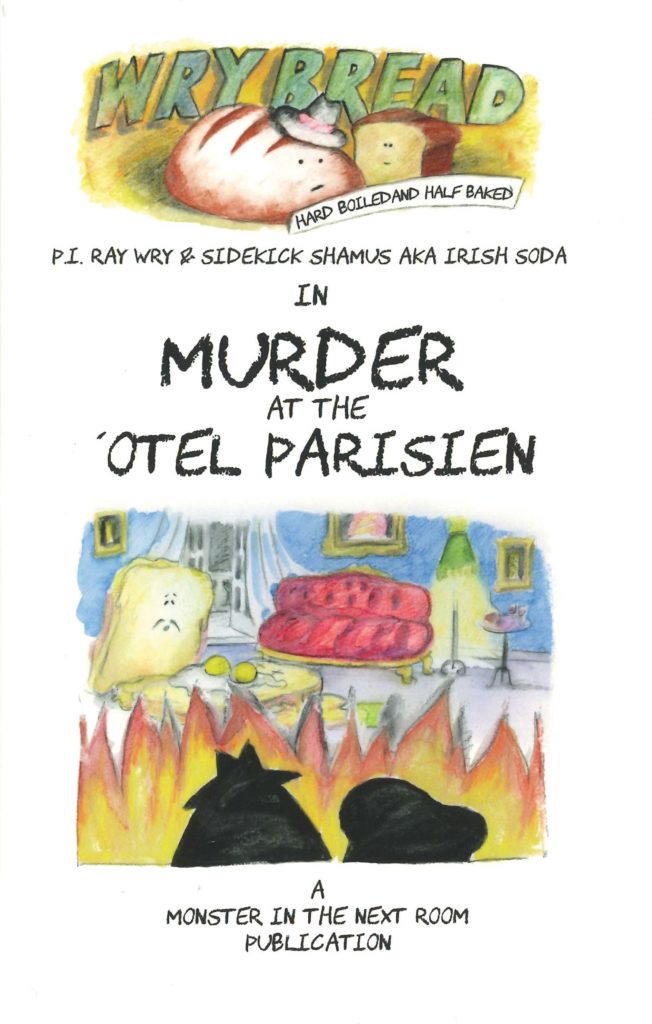Paula O’Hare rounds up the best of the latest Irish crime fiction
Murder at the ‘Otel Parisien. Clare Scott.Monster in the Next Room; 23pp; €10 hb; 21cm; 978-0-36-820202-5.
Hurrah, a detective novel for children! With illustrations! How on earth has it taken until now for this genre to emerge? And I can only hope for more. On the other hand, hiss, boo: this is a collection of the worst bread-based puns I have ever seen in my life. There is not a single bread type that is not press-ganged into playing a role—role/roll. D’yeh get me?
Clare Scott is an artist and cartoonist. She sets P.I. Ray Wry and his pal Shamus the Irish Soda loose to solve the murder of Yvette, wife of pastry chef Pierre. If your child shows a taste for this, get them on to Emil and the Detectives next, so they get 1929 Berlin under their belt, and then Harriet the Spy for 1964 New York.
47 Seconds. Jane Ryan. Poolbeg; 380pp; €15.99 pb; 23cm; 978-1781997758.
A Dublin detective story in which every character is stressed and irritable all the time. That’s the heroine DG Bridget Harney, every other Guard she deals with, her father the judge, the drug criminal Flannery, the rich young couple living in a footballer suburb of Birmingham and the rich old couple from Birmingham living in Dalkey.
If all that survives of Irish culture in the early 21st century is paperback crime novels, economists will have no difficulty at all reconstructing how real estate was priced relative to salaries, and anthropologists no difficulty reconstructing how it affected everyone’s happiness.
The cast of characters is linked by the discovery of the severed arm of a young girl in a freezer container in Dublin Port; followed, a few days later by its match in Birmingham. Bridget is sure it is the work of Flannery. She is so very sure that she feels that planting DNA evidence would be no more than justice at work. How will that play out?
A Conspiracy of Lies. Frank Connolly. Mercier Press; 346pp; €16.99/£14.50 pb; 21cm; 978-1-78117-662-7.
This is a ‘Reeling in the Years’ type retelling of Irish politics, summer 1974 to summer 1976, with fictional embroidery around the edges. The Dublin/Monaghan bombings happened; the Fine Gael–Labour government was perceived not to have done enough to investigate them; the Heavy Gang, and particularly its role in the Sallins mail train robbery investigation, gave cause for concern about human rights.
Frank Connolly chooses to use real names and events for the FG half of events and switches to pseudonyms for the Fianna Fáil half, where he starts to diverge from the provable facts. His fictional FF shadow Minister for Justice, Bob Clarke, has accepted £100,000 from a Canadian company to grant them oil and gas mining rights; he has hidden it in a bank in Bermuda; MI5 set up the bribe and its concealment; they try to blackmail him with that and, separately, they threaten that if a future FF government is not as tough on the IRA as the FG one is, there could be more bombings in the South.
Meanwhile, Joe the kitchen porter and Angela the student waitress are working in the Bistro, seeing Bob Clarke and his special adviser meet officials from the British Embassy; they overhear a conversation in which the words ‘the Loyalists couldn’t have done that on their own’ are said by the MI5 man. They are scandalised because they were both affected by the bombing; and they resolve to find a trustworthy journalist to expose the whole thing. There is no surprise reveal; there is no new insight; but it is solidly told and satisfying until the fairy-tale ending.
Oak and Stone. Dave Duggan. Merdog Books; 333pp; €15/£12 pb; 20cm; 978-1-9165016-1-4.
This is a police procedural set in Derry/Londonderry in a mildly parallel, near-present universe, in which everything seems the same except that there is now one police force for the island of Ireland, distinguished only as PS(N) and PS(S). By random luck or clairvoyance Duggan got ahead of the actual real-world news cycle in describing what does, or ought to, happen when a police vehicle from ‘N’ drives into ‘S’. And the hero is part of an experimental intake of former paramilitaries into the police.
Yes, that could be highly entertaining if pursued in the style of science fiction author Robert Heinlein, but, in fact, the story reverts to solidly Rankin, Chandler and finally Hammet lines. The hero is a rugged individualist solving crimes within the police force, not always telling his bosses the whole truth, staying in touch with contacts from back in the day, meeting mysterious private detectives from England, receiving unhelpful clues anonymously, attracting beautiful women and then not knowing what to do when he’s got them. The scene-setting and the people are more the point than the actual crime but, for good order, the dead body is a local professional footballer, shot with, it begins to seem, the detective’s handgun from his past life.
The Chain. Adrian McKinty. Orion Books; 368pp; £11.33 hb; 23cm; 978-140918958.
Adrian McKinty has given Irish readers seven of the darkest, funniest Irish crime novels in his Sean Duffy police thrillers set in 1970s Carrickfergus, and several more stand-alone crime novels set in Northern background. Like Paul Howard’s, his fantastic talent is normally unselfishly applied to subject matter that is appreciated best by a local market and it has always seemed unfair that this might limit the financial reward he gets.
Mr McKinty appears to have been thinking the same thing. This looks like a move to make himself more attuned to the international bestseller lists, and maybe onwards to Hollywood. He deserves good luck with it, and the book has everything it needs to get sold. It is set in New Hampshire, but could be transposed anywhere. Its characters—a good mother with cancer, a good but harmed veteran, and an intrepid girl—are not just in line with current fashions in Western cinema, they wouldn’t preclude Chinese funding either. Go, Adrian!

His biggest selling point is his killer plot premise. A parent’s phone rings and a voice tells them ‘I have kidnapped your child’. It is not the voice of a hardened professional criminal; it’s a parent, like themselves, audibly at the very outer edge of their tether saying ‘I am very very sorry about this but this appalling thing was done to me, now I have had to do it to you, and you are going to have to do it to someone else, in order to get your child back. And I am going to make you do it, in order to get my own child back’.
In its own right, the concept of a competent law abiding adult suddenly really needing to commit a serious crime, and working out how they would do it, is compelling. How would you go about getting a gun, a forged passport, stealing a car, smuggling drugs or going on the run and staying free? You need a stronger stomach to think about kidnapping a child, but hold your nerve, the story is worth it.
Paula O’Hare is a public sector lawyer who likes detective novels.
First Published in Books Ireland Sept/Oct 2019.














